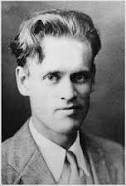Stranger Than Fiction: An Idea That Changed the World
Imagine if you had an idea that would change the world, one that would spawn industries and create jobs while providing entertainment to the masses and allowing artists, actors and musicians a medium to showcase their talents on the world stage.
Now, imagine you have this remarkable idea and you are just 14-years-old. That was the case for Philo Farnsworth.
Born in Utah in 1906, Philo developed an early interest in electronics. His interest in the world of electronics began when he heard his aunt’s voice on a telephone. Although she lived many miles away, she sounded as if she was in the room.
The miracle of electronics fascinated the youth who began tinkering with electronic devices in hopes of one day inventing an amazing device.
He began studying many books about the burgeoning field of physics and electronics and soon his family reaped the benefits of his knowledge.
When the generator broke down on the family farm, Philo repaired it. Noticing how hard his mother worked to turn the crank on her washing machine, Philo had an idea.
In those days washing machines operated with hand cranks and could be difficult to turn. Philo disconnected the hand crank on his mother’s washing machine and attached a small electric motor. Mrs. Farnsworth now had one of the few motorized washing machines in the state.
But, for Philo the greatest invention was yet to come. He had studied the works of engineers and soon began drawing designs for a machine that would revolutionize the world.
Once he completed his drawings he wanted to demonstrate it to his teacher. He drew his design on the blackboard in his school for his teacher one day who was astounded at what the 14-year-old inventor had created. He explained some of the components involved and demonstrated an electron tube he had created. The teacher was astounded by the youth’s understanding of science.
Philo called his device an “Image dissector.” While his designs were carefully detailed on paper, it took 7 more years for the young inventor to actually build the invention that changed the world. It took another 6 years to get the invention patented.
After building the prototype for the device, Philo demonstrated the device to his brother-in-law, Cliff Gardner who was amazed. While he liked the device, he told Philo he should consider giving the device a new name. After much thought, Philo changed the name of his device from image dissector to television. Incredibly, a 14-year-old had invented television.
Philo’s TV made only a single line transmitted by a camera. The following year, when Philo was 22, he first demonstrated his invention to the world for the first time.
He held a demonstration for the press and his investors in 1928. His investors were getting impatient and demanded to know when they would see dollars from the invention. Ever the clever soul, Philo displayed a dollar sign which brought laughs from his backers.
In 1929, the design was further improved by elimination of a motor-generator, so the television system now had no mechanical parts. That year, Philo transmitted the first live human images using his television system, including a three and a half-inch image of his wife Elma, with her eyes closed because of the blinding light required.
Television had been invented from the early sketches of a 14-year-old boy. The invention evolved creating a trillion dollar industry that forever changed the world and made Philo wealthy.
In the years to come Philo invented many other electronic devices but none ever achieved the world wide appeal of television. He died in 1971 at the age of 64. His wife, Elma, died in 2006 at the age of 98.
Michael Williams is the author of a book entitled “Stranger than Fiction: The Lincoln Curse.” The book is a collection of 50 strange and unusual but true stories. The stories will leave the reader convinced that perhaps Mark Twain was right when he said “truth is stranger than fiction.”
The book is 187 pages in a softbound edition with numerous photos. The book can be purchased from amazon.com for $19.95 plus shipping and handling or you can save shipping cost and save $2 on the purchase price by ordering a signed copy directly from the author. Send $17.95 to P.O. Box 6421 Sevierville, TN. 37864.
Williams has recently written a second book entitled “Great Kids in History.” The book is a collection of 22 stories of amazing kids that have accomplished amazing feats. It is available on amazon.com or on Kindle Direct. You can order a signed copy for your child by sending $8.95 to P.O. Box 6421 Sevierville, TN. 37864.
Both books are available in print or as an e-book. For more information visit the website www.strangerthanfictionnews.com










